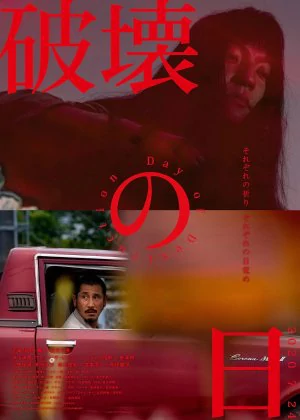The Day of Destruction

Surprise, surprise. Toshiaki Toyoda is back with another film! I've been a Toyoda fan since the early days, but his career has seen some ups and downs and even though he enjoyed a bit of international success in the beginning, people were quick to forget about him after his first hiatus. Luckily Toyoda is a creative spirit who can't be kept down, and so here he is with The Day of Destruction [Hakai no Hi], quite literally fresh of the press. It's a film that is sure to appeal to fans of the more experimental side of Toyoda, so you better brace yourself.
![screen capture of The Day of Destruction [Hakai no Hi]](/thumbs/img/articles/1200xauto/day-destruction-1.webp)
The Day of Destruction was a surprise announcement at the Japan Cuts film festival, a one-day offer that coincided with the Japanese theatrical release. The film itself was finished just days before its release, so it really was a scoop. Pre-corona these things meant absolutely nothing to me, but now that many fests are finally moving their offerings online (not always with global access, but one thing at a time I guess), I can finally get in on some of these premieres. Like many others, I jumped at the opportunity because who knows when the film will reach the West through regular channels (if ever).
Originally The Day of Destruction was made to coincide with the grand opening of the Tokyo Olympics Summer Games, but as we all know, COVID-19 got in the way of that. At least, it got in the way of the Olympics because the epidemic turned out to be extremely topical and fits right in with the rest of the film, almost to the point where it feels like this was supposed to be a COVID-19 film all along. Toyoda made great use of the situation and adapted his film about humanity's greed and self-interest to include our current epidemic head-on.
The story starts when a demon is born in the depths of a mine of a remote, rural village. The villagers pray at a local shrine to keep it docile, but the demon isn't going to be contained for long. All he needs is a human vessel, which he finds in a man whose sister is suffering from a mysterious new disease. Toyoda isn't too generous with explanations and most of the story needs to be pieced together by the audience, on the other hand this is mostly a mood piece anyway, so don't worry if there are some uncertainties left after watching the film. The message Toyoda wants to bring is clear enough.
![screen capture of The Day of Destruction [Hakai no Hi]](/thumbs/img/articles/1200xauto/day-destruction-2.webp)
Toyoda's films have always had a strong visual footprint and The Day of Destruction is no exception. From the very stylish black and white opening to the exquisitely framed and choreographed scenes later on, Toyoda makes sure every single shot counts. The camera work is strong, use of color and lighting is excellent and Toyoda makes perfect use of the rural setting. There are one or two visual effects that looked a little flaky (like the explosion early one), but they're quickly forgotten and are no doubt a result of the film's limited budget.
And then there's the soundtrack. Toyoda's track record is outstanding in this regard, and he's outdone himself this time. The punk tracks during the opening and closing credits set the tone, but it's the gnarly and distorted sounds coupled with stark rhythms and minute timing further on that really got me excited. It makes for a superb audiovisual experience, an atmosphere you can simply lose yourself in, while it also works wonders to reinforce the message Toyoda is bringing. Other directors should really take notice because this is how you do a film soundtrack.
Toyoda may not have had the biggest budget to work with, he sure has the respect of his peers and has no trouble drumming up an impressive cast. With people like Issei Ogata, Yôsuke Kubozuka and Ryûhei Matsuda on board you don't have to worry about the quality of the performances. The lead role is reserved for MahiTo The People though, frontman of Gezan (an alternative rock band that was also partly responsible for the soundtrack). He puts in an excellent performance as the tormented human shell of the demon. Quite a way to start an acting career.
![screen capture of The Day of Destruction [Hakai no Hi]](/thumbs/img/articles/1200xauto/day-destruction-3.webp)
The Day of Destruction is a raw and emotional film. The first half the narrative is sure to feel disjointed, almost fleeting. You'll have to do your own cut-and-paste work here to make sense of what you're seeing. During the second half things start to clear up, but it isn't until the finale that everything finally fits together, and you can begin retrofitting earlier scenes. That's not to say it's a very complex film, but it's certainly not very accessible and even though it's only 60 minutes long, its intensity and somewhat abstract nature is sure to put off some people.
Personally, I'm glad Toyoda is back to his rawer, more punk self. The Day of Destruction reminded me a lot of Toyoda's Blood of Rebirth and I think the two would make for an interesting back-to-back screening. The film is probably a little niche and it's not going to draw the same crowds as Blue Spring did, but true Toyoda fans are sure to have a blast with this one. It's raw, primordial and unfiltered emotion, an audiovisual experience that gripped me from the very first frame and didn't let go until long after the final credit had faded from the screen. My kind of cinema.